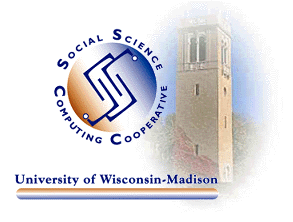
SAS to be Removed from ELAINE and MARIAH
Latest Virus Scares
Just a second reminder that the SAS licenses on ELAINE and MARIAH will not be renewed when they expire October 1. SAS usage on these two computers has fallen sharply since SAS became available on Linux and we can save approximately $4,000/year by dropping the licenses.
You can run your SAS jobs on Linux via KITE or CONDOR. Our Condor flock has thirteen CPUs, is capable of running Stata, SAS, R, FORTRAN, and C/C++ code, and will give your job exclusive use of a CPU while it runs. Best of all, there are almost always available processors just waiting for your job.
Submitting Stata and SAS batch jobs to Condor is extremely simple: log in to KITE as usual, and replace the usual stata or sas command with condor_stata or condor_sas. It will then run in the background on a Condor server. For example, replace
stata -b do bigprogram
with
condor_stata -b do bigprogram
and
sas bigprogram
with
condor_sas bigprogram
The only disadvantage to Condor is that it take about 30 seconds for a job to be assigned to a server before it can run. Thus it's not suitable for small jobs where you want the results right away. But for big jobs--the ones that cause slowdowns on KITE--it is ideal. For more information please see An Introduction to Condor.
There has been widespread publicity about a recent Microsoft security hole which could allow an attacker to compromise a Windows PC and gain control over it. Microsoft responded with an update to its operating system that protects PCs against the compromise. If you have a networked PC in the Social Science Building, your PC has already been updated using system management software we installed last April. With this software, we automate the installation of software updates and patches. (See the announcement in April's SSCC News.) This update is really our second line of defense though as our building's firewall prevents intruders from accessing our network to begin with.
If your PC is located elsewhere, you should go to Microsoft's
Windows update page and download and install all of the critical updates
for your computer. Installing the updates will also help protect you from a
recent email virus circulating called MiMail.
More information on MiMail can be found at SSCC's Current
Virus Threats and Virus Hoaxes web page. Recall that if you receive your
e-mail through SSCC, we use virus filtering software that prevents the spread
of e-mail viruses like MiMail by deleting the messages they send or "defanging"
suspect attachments by changing their names. (Refer to SSCC Publication, Virus
Protection at the SSCC, for more detailed information.) If you don't use
SSCC's mail server, you should be sure and update your virus protection files
on your PC if you haven't done so in the past week or two.
Go to previous editions of
SSCC News.
Go to the SSCC Home Page.
© 2003 University of Wisconsin Social Science Computing Cooperative